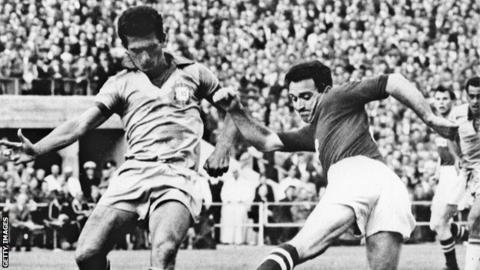World Cup 2018: Pele & the KGB - Soviet Union captain Simonyan recalls Sweden 58
- From the section World Cup

Nikita Simonyan captained the Soviet team at the 1958 World Cup in Sweden. They beat England in the group stage, and went through to the quarter-finals, where they lost to the hosts. He spoke to the BBC Russian Service about his memories of that competition and his footballing life.
It's 60 years since Nikita Simonyan ran out onto the pitch at the start of the World Cup in Sweden, but he remembers it as if it were yesterday.
"We were housed next to the Brazilians, and we'd sneak in to watch them training," he says, smiling as he remembers. "They'd brought this amazing new formation with them, the 4-2-4, and we could only marvel at how well they played. And of course they'd brought a new player with them, a skinny 17-year-old called Pele."
Simonyan, now 91, and three-time World Cup-winner Pele, 77, are still friends to this day. There are only five Brazilians still alive from the 1958 squad, and only two from the Soviet team. Simonyan shakes his head as he thinks of his team-mates from that long-ago era.
"Well, they'll have their own team somewhere up in the sky now," he says wistfully.
What little hair he has left is silver, and in recent years he's slowed down, but the sparkle in his eyes when he talks of his beloved game is still there and he chuckles when he thinks back to that World Cup.
He also remembers meeting Sir Bobby Charlton in Sweden and the two have met again down the years. He rummages in a box to find a black-and-white photo of the two of them together.

They saw each other again in 2010 when Fifa met to decide who would host the 2018 [and 2022] World Cups. "Bobby Charlton and David Beckham were visibly upset when it was announced that Russia would be the hosts," he says. "I hope they have got over it now!"
Two years before Sweden, Simonyan had travelled to the Melbourne Olympics, where the Soviets took the gold medal. On their return - an arduous journey that involved a 20-day ferry trip to Vladivostok, followed by an eight-day train ride to Moscow - the team were given a heroes' welcome on Komsomol Square, where a huge crowd turned out to welcome them home.
"It made a huge impression on me," Simonyan remembers.
In the wake of the Olympics, there were high hopes for the Soviets at the 1958 World Cup. And to begin with, it looked as though they were in with a chance.
Despite being placed in what experts considered to be the toughest group in the competition, the Soviets made it through.
They lost 2-0 to the Brazilians, but beat the Austrians 2-0 and drew 2-2 with England, Simonyan scoring the first goal of the match. England's hopes of winning the competition were dashed as the Soviets then won 1-0 in a play-off to see who would reach the last eight.
"We went forward to the quarter-finals," Simonyan says, "which meant we were one of the eight best teams in the world."
But a repeat of the Olympic success wasn't to be: they lost to their hosts, Sweden, who would themselves be defeated by Brazil in the final.

"Of course we were expected to win the competition, and so we faced a barrage of criticism when we got home," Simonyan remembers sadly. "I actually thought we'd played very well, but the [Communist] Party considered our performance a failure. Well, that was the system back then."
When they weren't playing football, they would go swimming in the nearby lakes.
"Our legendary goalkeeper Lev Yashin loved fishing. So he went off and got himself a fishing rod and off he'd go to catch some fish," he says, laughing as he recalls.
Of course it went with the territory that they were followed everywhere by minders from the KGB, the Soviet secret police. Did it bother him?
"Oh no," he laughs. "We knew they were just doing their job. We were even on friendly terms with them."
Born in Armavir in the south of Russia to Armenian parents, Simonyan always knew he wanted to be a footballer.
His father was a cobbler, and when Simonyan was four, his family moved to Abkhazia on the Black Sea. There he would spend hours every day, kicking a tennis ball against a wall in their tiny backyard.
"There were two Cypress trees at the bottom of the garden, and that's where I'd score my goals," he remembers.

After '58, Simonyan played one more season with Spartak Moscow - he was one of the team's best players, and their top goal scorer in 1949, 1950 and 1953 - before hanging up his boots and becoming the team's manager and head coach. He also coached Armenia's Ararat Yerevan.
These days, he's vice-president of the Russian Football Union and, despite his age, he's at his desk every morning. He was one of the guests of honour at the Fifa World Cup draw in Moscow in December 2017.
As for this year's World Cup, he reckons the Russian team - which at 66th is the second lowest in the world rankings, one place ahead of Saudi Arabia, among the finalists - will face some tough competition. But he's hopeful they will perform well.
"They're well prepared physically and tactically," he says, "but the most important thing is that they should be prepared psychologically for the World Cup."
Of course he speaks from experience. And will he be watching the matches?
"I'm not sure about the ones outside Moscow," Simonyan says, stretching his creaky legs. "But the ones in the capital? You bet!"



